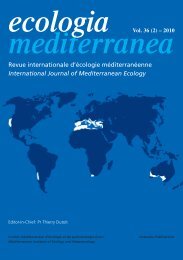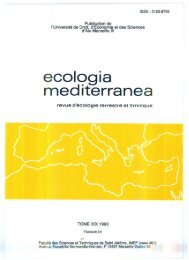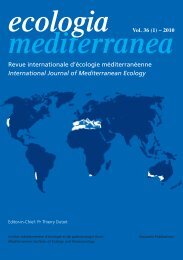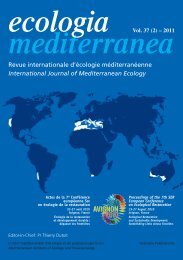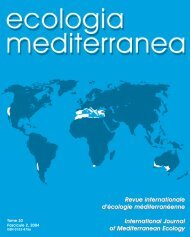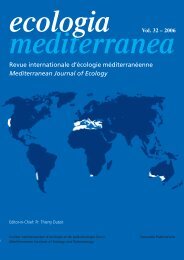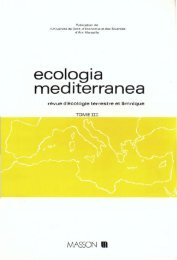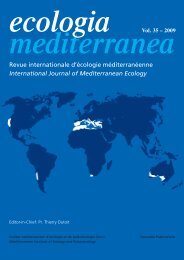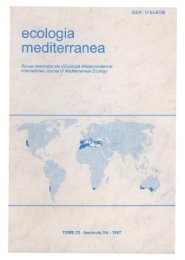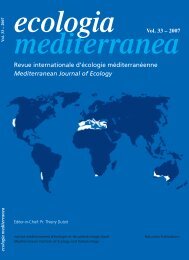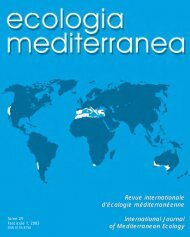Revue internationale d'écologie méditerranéenne International ...
Revue internationale d'écologie méditerranéenne International ...
Revue internationale d'écologie méditerranéenne International ...
You also want an ePaper? Increase the reach of your titles
YUMPU automatically turns print PDFs into web optimized ePapers that Google loves.
264<br />
◆ ANALYSES D’OUVRAGES<br />
tradition, une bibliographie conséquente (plus de 700 références)<br />
conclut l’ouvrage et constitue un véritable tour d’horizon de<br />
l’ornithologie marocaine. A noter qu’un problème technique a<br />
sans doute été à l’origine de la non-impression des 20 dernières<br />
références qui sont disponibles à l’adresse internet suivante :<br />
www.bou.org.uk/pubchkl.html.<br />
Voilà donc en conclusion, un ouvrage qui était très attendu<br />
par la communauté ornithologique du Paléarctique (aucun<br />
ouvrage de synthèse n’était paru depuis les années 1960) et qui<br />
ne déçoit pas ses lecteurs. A la lecture fine de certains commentaires<br />
des auteurs, on est cependant frappé par la fragilisation<br />
récente de nombreux groupes tout entiers, dont le braconnage,<br />
la chasse intensive ou la dégradation des milieux semblent devoir<br />
avoir bientôt raison. L’effondrement des populations de nombreuses<br />
espèces de rapaces diurnes en particulier, semble en ce<br />
sens particulièrement critique et terriblement préoccupant.<br />
ERIC VIDAL<br />
Institut méditerranéen d’écologie et de paléoécologie<br />
(IMEP, UMR CNRS 6116),<br />
Université d’Aix-Marseille III, Europôle de l’Arbois,<br />
BP80. F-13545 Aix-en-Provence cedex 04<br />
Invasion biology:<br />
critique of a pseudoscience<br />
David I. Theodoropoulos<br />
Avvar Books, Blythe (California), 237 p. (2003) www.avvar.com<br />
David I. Theodoropoulos’ book draws attention to the importance<br />
given by today’s scientific community to the phenomenon<br />
of biological invasions. Currently, biological invasions are often<br />
cited as the second most important menace to the world’s biodiversity,<br />
a view adamantly countered by Theodoropoulos. Some<br />
of his more notable conclusions include that, all to the contrary,<br />
anthropogenic dispersal is ecologically beneficial, increases<br />
biological diversity, speeds evolution, and protects taxa from<br />
extinction. He criticises invasion biologists for unjustifiably<br />
extrapolating from non-representative or poorly constructed<br />
field conditions, and demonstrating extremism. In addition, he<br />
states that “faulty categories, emotionalism, and fundamental processes<br />
of human psychology lie at the root of the spread of invasion<br />
fears, and have caused the misperceptions and misattributions from<br />
which the ideology of invasion biology is constructed.” He has even<br />
connected invasion biology to the Nazis and financial support<br />
from destructive corporations !<br />
Ironically, his black-and-white analysis of the debate appears<br />
as extreme or more so than the present behaviour of the scientific<br />
community, where farfetched psychological links should not enter<br />
into play (one hopes). Notably, his strong, blanket assertions,<br />
some of which are exampled above, are just as untenable as their<br />
opposites. In addition, the literature on the subject, especially that<br />
dealing with plant invasions, is permeated with studies examining<br />
the role of human disturbance in the invasion process, and explicitly<br />
states that only a fraction of exotic species are considered as<br />
pests. This does not seem nearly as extreme as Theodoropoulos’<br />
finger pointing makes it out to be. Furthermore, a casual glance<br />
at the causes of rarity given in several red lists indicates that<br />
there definitely is a problem associated with biological invasions.<br />
Now, to what extent this problem is restricted to islands, or is<br />
comparable to or interacts with something like habitat loss, or<br />
other causes of rarity, is more difficult to say. Theodoropoulos’<br />
provocation is useful and welcome in that it incites the scientific<br />
community to deepen the basis for what is currently regarded<br />
as a global problem. A meta-study ranking documented causes<br />
of rarity/extinction and studying their interaction would be a<br />
good start. However, to casually dismiss the biological invasion<br />
phenomenon is senseless; one has only to remember the havoc<br />
wreaked on Australia.<br />
CAREY M. SUEHS<br />
Institut méditerranéen d’écologie et de paléoécologie<br />
(IMEP, UMR CNRS 6116),<br />
Université d’Aix-Marseille III, Europôle de l’Arbois,<br />
BP80. F-13545 Aix-en-Provence cedex 04<br />
ecologia mediterranea, tome 29, fascicule 2, 2003



